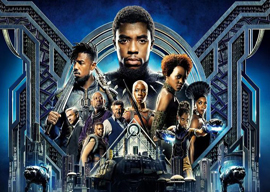
February 21, 2018

On the other hand, Lesotho, despite its abundant problems, has some sources of pride as a monocultural ethno-state (its name translates into “the land of the people who speak Sesotho”):
Poverty and unemployment rates are high, violent crimes are common, and there are many reports of rape and abuse against women…. But there are also sources of stability and wealth: Most people in Lesotho own their own land and their own homes. They speak the same language and share the same religion.
While Lesotho is a constitutional monarchy, I suspect that Coogler was also inspired by the other southern African enclave nation, Swaziland, which is an absolute monarchy.
In Africa, however, megalomaniacal big-man predilections usually get in the way of good government under any system of government.
For instance, King Mswati III of Swaziland currently has fifteen wives, while his father had more than 125. The king holds a festival in which he picks a new bride annually from among 40,000 topless virgins dancing to catch his attention. (In Lesotho, in contrast, King Letsie III is largely powerless and perhaps therefore has only one wife.)
Polygamy tends to hinder the emergence of an aristocratic class that elevates manners because the big men expend their resources not on living in a more refined fashion, but in acquiring more wives. As Theodore Dalrymple pointed out, the more female relatives an African big man has, the more he is nagged to subsidize an ever-expanding circle of their layabout male kinfolk, which is a major reason Africa is so corrupt.
Real-life African big men are at least more entertaining than Black Panthers’. Forest Whitaker won a Best Actor Oscar for playing in Last King of Scotland the Ugandan dictator Idi Amin, who proclaimed himself Lord of All the Beasts of the Earth and Fishes of the Sea and Conqueror of the British Empire in Africa in General and Uganda in Particular. President Mobutu of the Congo changed his name to The Cock Who Goes from Hen to Hen Knowing No Fatigue.
In fictional Wakanda, however, King T’Challa chastely resists the advances of a solitary ex-girlfriend.
But his lack of mojo at least inclines him to follow his ancestors’ enlightened tradition of prudent nationalism. He first must head off a tribalist challenge to national unity. Although four tribes are reconciled to his rule, he defeats in ritual combat the lord of the fifth tribe from the snowy mountains.
Then, his globalist ex-girlfriend argues that Wakanda should use its high-tech riches to help the countless poor of Africa by opening its borders. But as an adviser to the king sagely points out:
“If we let in refugees, they will bring their problems with them and then Wakanda will be like anyplace else.”
Indeed.
The king takes more seriously the challenge from his long-lost cousin from Oakland (where the Black Panther political party was formed in 1966 a few months after the first Black Panther comic book by Stan Lee and Jack Kirby came out). While the king’s sweetheart wants to invite the world, the king’s rival wants to invade the world by sending Wakanda’s high-tech vibranium weapons to black criminals abroad so they can gun down their racist oppressors.
King T’Challa, however, subscribes to his ancestors’ views that Wakanda, with its priceless Magic Dirt, should first take care of its own business. When Poland and Hungary subscribe to a similar view, it’s considered horrifyingly extremist, but when a nonexistent African country does it, it’s the height of political wisdom.